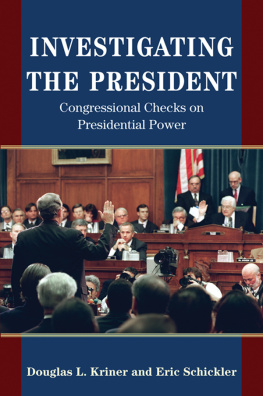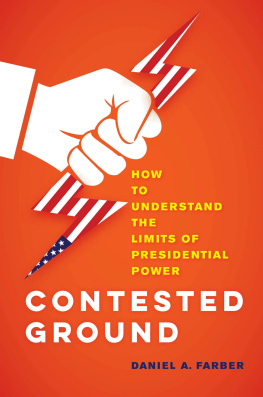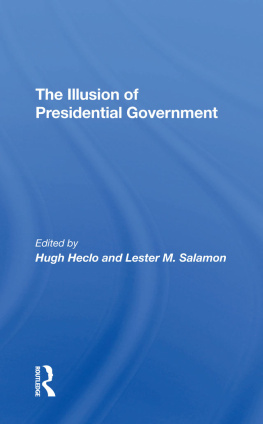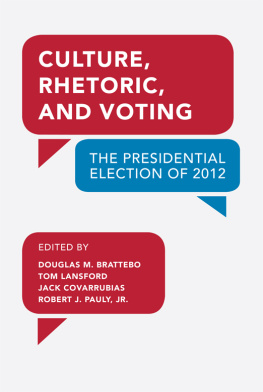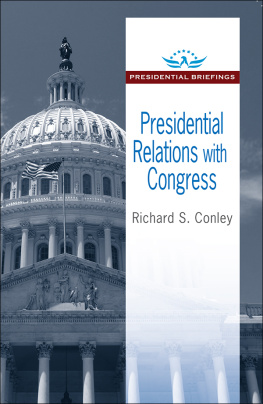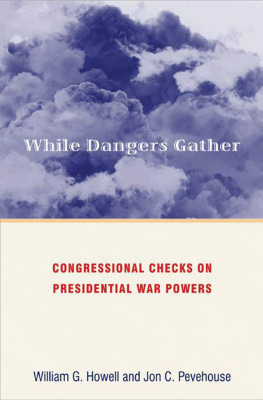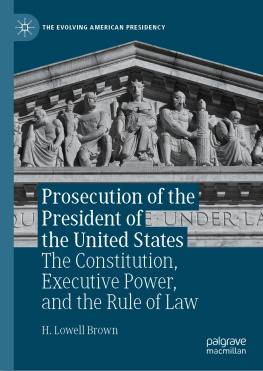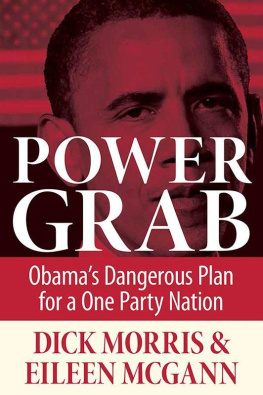INVESTIGATING
THE PRESIDENT
~ ~ ~
INVESTIGATING THE PRESIDENT
C ONGRESSIONAL C HECKS ON P RESIDENTIAL P OWER
~~~
Douglas L. Kriner
and
Eric Schickler
PRINCETON UNIVERSITY PRESS
PRINCETON AND OXFORD
Copyright 2016 by Princeton University Press
Published by Princeton University Press, 41 William Street, Princeton, New Jersey 08540
In the United Kingdom: Princeton University Press, 6 Oxford Street, Woodstock, Oxfordshire OX20 1TR
press.princeton.edu
Cover photograph: Scott J. Ferrell / Congressional Quarterly / Alamy
All Rights Reserved
Library of Congress Cataloging-in-Publication Data
Names: Kriner, Douglas L., author. | Schickler, Eric, 1969 author.
Title: Investigating the president : congressional checks on presidential power / Douglas L. Kriner, Eric Schickler.
Description: Princeton, New Jersey : Princeton University Press, 2016. |
Includes bibliographical references and index.
Identifiers: LCCN 2016010111 | ISBN 9780691171852 (hardback) | ISBN 9780691171869 (paperback)
Subjects: LCSH: Legislative oversightUnited States. | Governmental investigationsUnited States. | United States. CongressPowers and duties. | Executive powerUnited States. | BISAC: POLITICAL SCIENCE / Government / Executive Branch. | POLITICAL SCIENCE / Government / Legislative Branch.
Classification: LCC JK585. K76 2016 | DDC 328.73/07456dc23
LC record available at https://lccn.loc.gov/2016010111
British Library Cataloging-in-Publication Data is available
This book has been composed in Sabon
Printed on acid-free paper.
Printed in the United States of America
1 3 5 7 9 10 8 6 4 2
For Jillian Goldfarb and Terri Bimes
Tables and Figures
~ ~
C HAPTER 2
Appendix
C HAPTER 3
Appendix
C HAPTER 4
C HAPTER 5
Appendix
C HAPTER 6
C HAPTER 7
Acknowledgments
~ ~
W E ARE GRATEFUL for the thoughtful insights and feedback provided by many individuals who read drafts or responded to queries throughout this project. We would specifically like to thank: Dino Christenson; Linda Fowler; William Howell; Walter Oleszek; Andrew Reeves; Liam Schwartz; Rebecca Thorpe; Robert van Houweling; and our anonymous reviewers. Seminar participants at American University, Boston University, University of Houston, the American Political Science Association, and the Midwest Political Science Association provided still more valuable feedback and suggestions. The excellent research assistance of Margaret Helms, Adrienne Hosek, Ruth Bloch Rubin, Michael Dougal, and Greg Elinson is gratefully acknowledged.
For generous financial support, we thank the Dirksen Center for Congressional Research, Boston University, and the University of California, Berkeley.
Finally, we would also like to thank everyone at Princeton University Press who helped bring this project to fruition. We would specifically like to thank our editor, Eric Crahan, for his guidance throughout the project, as well as Jay Boggis, Nathan Carr, Maria DenBoer, Alexandria Leonard, and Ben Pokross.
INVESTIGATING
THE PRESIDENT
~ ~ ~
CHAPTER 1
~ ~
Introduction
I N 1944, M ISSOURI senator Harry S Truman, who four years earlier had cast little shadow on the American political stage, joined Franklin Roosevelt atop the Democratic ticket as the vice-presidential candidate. What could account for the meteoric rise of a junior senator once known as a pawn of Kansas City powerbrokers like Tom Pendergast to a figure of national stature, whom the media judged to be one of the ten most valuable officials in Washington? Strikingly, Truman built his public reputation not through legislating, but by investigating as chair of the Senate Special Committee to Investigate the National Defense Program. Truman lobbied to create the committee to discover and correct instances of fraud and abuse in government contracting and war procurement programs. While the Roosevelt administration initially resisted any move that would empower congressional snooping into its conduct of the war effort, it eventually relented, and the committee compiled an impressive record of rooting out fraud, abuse, and maladministration during its three-year history.
In a speech to the Senate upon resigning his chairmanship of the committee, Truman extolled investigations as critical to ensuring Congresss place in our separation of powers system: In my opinion, the power of investigation is one of the most important powers of Congress. The manner in which the power is exercised will largely determine the position and prestige of the Congress in the future.
The intervening forty years since Schlesinger wrote have produced no shortage of congressional investigations of alleged executive-branch malfeasance. Moreover, as Iran-Contra and the Monica Lewinsky scandal made clear, Richard Nixon would not be the last chief executive to fret over the very future of his presidency in the face of an investigative maelstrom on Capitol Hill. And yet, scholarly assessment of congressional investigations has been limited both in quantity and in scope. A legal literature has traced the evolution of the constitutional and legal authority underlying congressional investigations of the executive branch.
Building on Trumans and Schlesingers insight, we take seriously the idea that investigations offer Congress a valuable tool for constraining an ascendant executive. Investigations do not require the assent of both chambers, the construction of a supermajority to avoid a Senate filibuster, or the presidents approval. Critically in an era of intense partisan polarization and seeming institutional dysfunction, Congress can therefore investigate when it cannot legislate. To be sure, investigations cannot, on their own, compel presidential compliance and mandate changes in public policy. Moreover, Congresss investigative zeal waxes and wanes over time depending on the mix of incentives encouraging members to expose or pass over alleged executive-branch misconduct. However, when Congress does investigate, it can focus public scrutiny on the executive branch and bring public pressure to bear on the White House in ways that can materially affect politics and policy.
Of course, investigations are a somewhat blunt instrument of counter-attack. Congress does not and cannot investigate every instance of presidential aggrandizement. However, Congress can use the investigative tool to weaken the president politically. And because presidents anticipate Congresss capacity to inflict political damage, the threat of investigations can limit presidential autonomy more broadly, even if the political costs investigations impose may often be fairly general, rather than tied to reversing a specific abuse.
W HY C ONGRESS C AN I NVESTIGATE W HEN I T C ANNOT L EGISLATE
If the constitutional framework of separation of powers sets up an invitation to struggle among the branches, the Congress enters the battle at a distinct disadvantage vis--vis the executive. The Constitution grants Congress an array of tools to defend its institutional prerogatives and restore the balance of power. Yet, while the Framers plainly believed that Congress would be the most powerful branch, Congress confronts several institutional limitations on its ability to respond to presidential power grabs.
First, as Terry Moe has stated most forcefully, Congress is beset by collective action problems.

